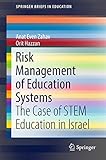Risk Management of Education Systems [electronic resource] : The Case of STEM Education in Israel / by Anat Even Zahav, Orit Hazzan.
Material type: TextSeries: SpringerBriefs in EducationPublisher: Cham : Springer International Publishing : Imprint: Springer, 2017Description: XVII, 91 p. 6 illus. online resourceContent type: text Media type: computer Carrier type: online resourceISBN: 9783319519845Subject(s): Education | Risk management | Teaching | Economic policy | Education | Teaching and Teacher Education | Risk Management | R & D/Technology Policy | Popular Science in Business and ManagementAdditional physical formats: Printed edition:: No titleDDC classification: 370.711 LOC classification: LB1024.2-1050.75LB1705-2286Online resources: e-book Full-text access
TextSeries: SpringerBriefs in EducationPublisher: Cham : Springer International Publishing : Imprint: Springer, 2017Description: XVII, 91 p. 6 illus. online resourceContent type: text Media type: computer Carrier type: online resourceISBN: 9783319519845Subject(s): Education | Risk management | Teaching | Economic policy | Education | Teaching and Teacher Education | Risk Management | R & D/Technology Policy | Popular Science in Business and ManagementAdditional physical formats: Printed edition:: No titleDDC classification: 370.711 LOC classification: LB1024.2-1050.75LB1705-2286Online resources: e-book Full-text access | Item type | Current library | Collection | Call number | Copy number | Status | Notes | Date due | Barcode |
|---|---|---|---|---|---|---|---|---|
| E-Books | MEF eKitap Kütüphanesi | Springer Nature | LB1024.2 -1050.75 (Browse shelf (Opens below)) | Available | NATURE | 1419939-1001 |
Browsing MEF eKitap Kütüphanesi shelves Close shelf browser (Hides shelf browser)

|

|

|

|

|

|

|
||
| LB1024.2 -1050.75 Global Teaching Southern Perspectives on Teachers Working with Diversity / | LB1024.2 -1050.75 Being Self-Study Researchers in a Digital World Future Oriented Research and Pedagogy in Teacher Education / | LB1024.2 -1050.75 Reflective Theory and Practice in Teacher Education | LB1024.2 -1050.75 Risk Management of Education Systems The Case of STEM Education in Israel / | LB1024.2 -1050.75 A Companion to Research in Teacher Education | LB1024.2 -1050.75 The Challenge of Teaching Through the Eyes of Pre-service Teachers / | LB1024.2 -1050.75 Studying the Effectiveness of Teacher Education Early Career Teachers in Diverse Settings / |
STEM Education in the World -- Strategic Analysis -- STEM Education in Israel: A Case Study -- Phase A: Risk Identification - Identification of Risk Categories by SWOT Analysis of STEM Education in Israel -- Phase B: Risk Rating -- Phase C: Risk Response -- What Can STEM Education Systems in the World Learn from the Israeli Case?.
This work illustrates how risk management can be applied to educational systems in general, and STEM (Science, Technology, Engineering and Mathematics) education in particular. The rationale for this approach stems from the increased awareness of the importance and contribution of STEM education to nations' economic growth and development. The coverage begins with the challenges of STEM education systems, and concludes with a thorough strategic risk response plan. The text outlines a risk-management plan/program for STEM education in Israel, based on the conceptions of five stakeholders groups: educators, academics, industry professionals, military and philanthropic actors. All of whom have expressed interest in promoting STEM education in the high school/secondary education system. The result, ultimately, presents an impressive, meaningful, and practical understanding of the difficulties and challenges, together with applicable modes of action, and a new horizon towards which STEM Education should march.
5
